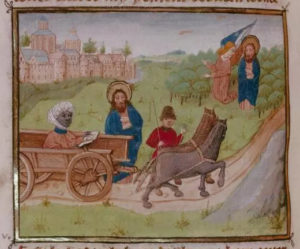
Acts 8:32–35:
Now the passage of the Scripture that he was reading was this:
“Like a sheep he was led to the slaughter
and like a lamb before its shearer is silent,
so he opens not his mouth.
In his humiliation justice was denied him.
Who can describe his generation?
For his life is taken away from the earth.”
And the eunuch said to Philip, “About whom, I ask you, does the prophet say this, about himself or about someone else?” Then Philip opened his mouth, and beginning with this Scripture he told him the good news about Jesus. (ESV)
The Ethiopian eunuch was reading Scripture while riding in his chariot. In particular, he was reading Isaiah chapter 53 and he asked Philip to explain what this passage in Isaiah meant. Right there and then, the Ethiopian and Philip were engaged in a Bible study.
Philip was prompted by the Holy Spirit to travel south from where he was to a place God knew Philip would meet up with the eunuch. There, Philip heard the Ethiopian reading and asked him if he understood what he was reading. The Ethiopian did not, Philip explained it and soon after, the Ethiopian wanted to accept the Gospel message and be baptized.
Have you read the Bible and come across difficult passages, wishing someone would explain it to you? Part of Sunday morning services at Christ Church are devoted to teaching in our BibleLife classes and preaching in the morning worship. Understanding the Scriptures is so important and, like Philip, we jump at the opportunity to explain the Bible verse by verse, chapter by chapter.
God did not create a secret document that only a few can understand. The Bible is God’s message for everyone. Jesus Christ has paid the penalty for our sin. He bled and died for us. It is up to us, like the Ethiopian, to accept – by faith – this great gift from God.
Romans 3:23–25:
For there is no distinction: for all have sinned and fall short of the glory of God, and are justified by his grace as a gift, through the redemption that is in Christ Jesus, whom God put forward as a propitiation by his blood, to be received by faith. This was to show God’s righteousness, because in his divine forbearance he had passed over former sins. (ESV)
